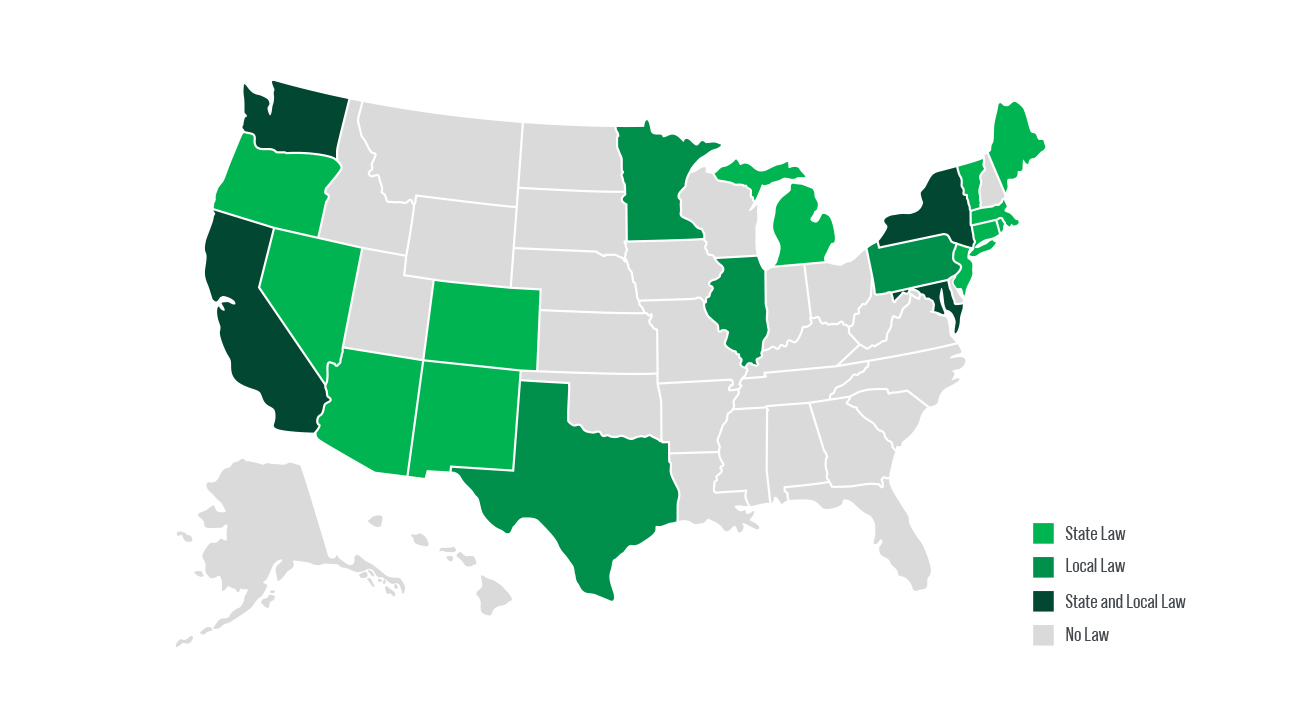With recent expansions and state-specific additions, paid sick leave laws are a trending topic that is impacting businesses like yours all across the country. What should employers know in order to manage their own compliance and HR functions in this dynamic landscape? Remember, every organization’s situation is different, but we’ve collected a few pointers to help navigate these new regulations.
Where you live matters
Regulations change from state to state, so it’s essential that employers are aware of what’s happening in their area. For example, several states and localities are currently requiring (or are in the process of requiring) employers to offer paid sick leave for workers to recover from illness, seek medical care or care for a sick relative. Here are just a few examples of these efforts.
- Washington — After July 25, legislation will expand the definition of ‘Family Member’ under the state’s Paid Family and Medical Leave (PFML) program to include individuals residing in the employee’s home or where the relationship creates an expectation that the employee will provide care for said individuals and that individual depends on the employee for care.
- Chicago — On April 21, Chicago City Council passed an ordinance prohibiting employers from taking adverse action against workers taking time off to get a COVID-19 vaccine and cannot force employees to be vaccinated during off-shift hours. In some cases where an employer mandates the vaccine, these organizations may be required to compensate employees for their time.
- California — As of March 29, employers must provide certain employees with supplemental paid sick leave, which can be used for vaccine-related reasons.
- New York — As of March 12, public and private employees must receive a “sufficient period of time” of paid leave for COVID-19 vaccinations, and these hours cannot be deducted from earned or accrued leave.
Wherever you’re located, it’s essential to research local laws and ordinances to get a full picture of employer responsibilities and employee protections. Start by consulting your state and local websites for up-to-date information on relevant legislation.

Read up on federal regulations
The biggest laws tend to get the biggest headlines, so you’ve probably heard about the Families First Coronavirus Response Act (FFCRA) and the American Rescue Plan Act (ARPA). As national pieces of legislation, these are applicable to all states and should be on the radar of organizations large and small.
The FFCRA includes provisions for paid sick leave and Social Security tax credits for participating employers.
The ARPA is more recent, passed in March 2021, and offers extended tax credits for employers who continue to offer paid sick leave through Sept. 30, 2021. This is a vital piece of legislation that can affect your bottom line, so we recommend familiarizing yourself with its guidelines and limitations.
Are you classified as a small business? The ARPA also provides a tax credit for small businesses (fewer than 500 employees) that voluntarily paid wages for employees while they were getting the COVID-19 vaccine. This tax credit covers up to $511 per day of paid sick leave, and you can read more about it in this White House fact sheet.
What can employers do to stay ahead of the curve?
When it comes to the rapidly shifting landscape of government legislation, it’s essential that you have reliable and timely resources to help you make the necessary updates to your policies. HR tech providers like Paycom offer a variety of resources and tools to help reduce a company’s exposure to audits and penalties arising from these rapidly changing employment laws.
With the added demand of vaccinations, medical appointments and potential sick leave, keeping track of time-off requests and scheduling can be a challenge for any employer. A self-service app allows employees to control their time punches, view schedules and make time-off requests, organizing and streamlining the process.
Plus, empowering employees to own time punch data while limiting managers’ ability to change those punches increases accuracy and, in turn, helps reduce liability. Paycom’s Time and Attendance tool and Employee Self-Service® make this possible, just like Manager on-the-Go® makes it easy for leaders to track schedules and approve requests for leave.
This is a unique time, but with the right tools and timely information, employers can find a way to maintain business continuity while providing the support their employees require. For more information about all the ways that Paycom can support your efforts, take a look at our comprehensive HR tech solution.
DISCLAIMER: The information provided herein does not constitute the provision of legal advice, tax advice, accounting services or professional consulting of any kind. The information provided herein should not be used as a substitute for consultation with professional legal, tax, accounting or other professional advisers. Before making any decision or taking any action, you should consult a professional adviser who has been provided with all pertinent facts relevant to your particular situation and for your particular state(s) of operation.
